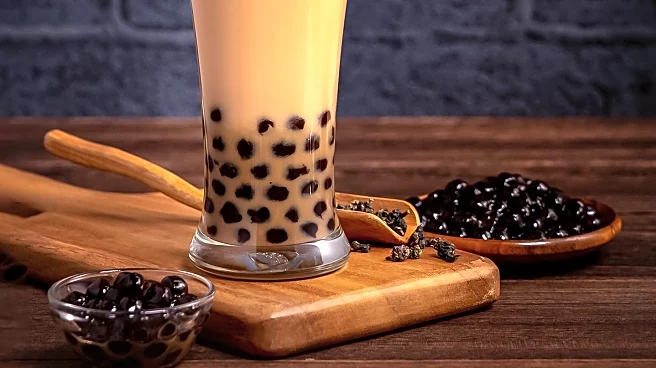What's Happening?
Consumer Reports has conducted safety tests on bubble tea products from major chains Gong Cha and Kung Fu Tea, as well as packaged boba from Trader Joe’s and Wu Fu Yuan. The tests revealed that all samples contained lead, a heavy metal known to pose health risks. Although the detected levels were not high enough to warrant complete avoidance, Consumer Reports suggests treating bubble tea as an occasional indulgence rather than a daily staple. The presence of lead is attributed to the cassava used in tapioca pearls, which can absorb heavy metals from the soil. Health experts emphasize that no amount of lead is safe, particularly for children and pregnant individuals. Trader Joe’s has responded by discontinuing its Instant Boba Kit, while Wu Fu Yuan has committed to enhancing its quality control measures. Kung Fu Tea and Gong Cha have not commented on the findings.
Why It's Important?
The discovery of lead in bubble tea products raises significant health concerns, especially for vulnerable groups such as children and pregnant women. Lead exposure can have detrimental effects on health, including developmental issues in children. The findings highlight the need for consumers to be cautious about their intake of bubble tea and similar products. This situation also underscores the importance of stringent quality control measures in the food industry to ensure consumer safety. Companies involved may face increased scrutiny and pressure to improve their product safety standards, potentially impacting their market reputation and consumer trust.
What's Next?
Following the report, companies involved may need to reassess their sourcing and production processes to mitigate lead contamination. Regulatory bodies could also step in to enforce stricter safety standards for food products containing ingredients prone to heavy metal absorption. Consumers are likely to become more vigilant about the safety of bubble tea and similar treats, possibly affecting sales and prompting businesses to innovate safer alternatives. The broader food industry might see a push towards transparency in ingredient sourcing and manufacturing practices.
Beyond the Headlines
The issue of lead contamination in bubble tea highlights broader concerns about food safety and the presence of heavy metals in everyday consumables. It raises ethical questions about the responsibility of food producers to ensure the safety of their products and the role of regulatory agencies in protecting public health. This development could lead to increased consumer demand for organic and sustainably sourced ingredients, potentially driving long-term shifts in food production and consumption patterns.









